Revisiting "Lesbian Literature" with Terry Castle
Description
In this trip to the Queer Lit archives, (the) Prof Terry Castle (Stanford University) joins me to discuss a corpus I don’t usually think about: lesbian content produced by cis-male authors. We talk about what’s great and not so great about these texts, which moments in literary history opened new doors for queer representation and why literature is such an apt medium to understand the fluidity of gender and attraction. Of course, we talk about many lesbian-authored texts as well and I am particularly grateful that Terry was open to talk about her own story and coming out.
Works by Terry mentioned:
The Professor and Other Writings (Harper Collins, 2010)
“The Lesbianism of Philip Larkin” (Daedalus 136.2, 2007)
The Literature of Lesbianism: A Historical Anthology from Ariosto to Stonewall (Columbia UP, 2003)
The Apparitional Lesbian: Female Homosexuality and Modern Culture (Columbia UP, 1993)
Other writers and texts mentioned:
Rita Mae Brown’s Rubyfruit Jungle
Shakespeare’s As You Like It and Twelfth Night
Ariosto
John Cleland’s Fanny Hill
Diderot
Balzac
Flaubert
Gautier’s Mademoiselle de Maupin
Collette’s Claudine novels
Sue Lanser’s Sexuality of History
Diana Souhami’s No Modernism without Lesbians
Aphra Behn
Natalie Barney
Djuna Barnes
Juvenal
Martial
Sappho
D.H. Lawrence’s The Rainbow
Henry James’ The Bostonians
Ernest Hemingway’s “The Sea Change” and The Garden of Eden
Gertrude Stein
Marcel Proust
Virginia Woolf’s Mrs Dalloway
Lord Byron
Ahhhh! We didn’t get to talk about Terry’s art! Check it out on Instagram and Twitter (@ThierryChateau) and give me a follow as well, if you like (@queerlitpodcast).
Questions you should be able to respond to after listening to this episode:
1.We briefly reference Terry’s book ‘The Apparitional Lesbian’ (1993). Please do a little bit of research on what the book is about and on what ‘apparitional’ can mean.
2.What is Terry’s favourite time in lesbian literary history and why?
3.Which types of female characters do we find in the 18th-century realist novel? Why is that interesting?
4.Terry talks about male writers producing lesbian literature. What are your thoughts on this? Please try to think through more than one position.
5.Why do writers go back to Ancient Greece to think about homosexuality? From what time onwards? What restricted access to texts?
6.Please comment on flat and round characters in Mrs Dalloway. Do you agree with Terry’s perspective?
More Episodes
Have you thought to yourself recently: How come trans literature is having such a moment right now? Then this episode is for you. Sabine Sharp, editor of The Routledge Handbook of Trans Literature (2024), is joining me for a chat about the significance of trans literature today, as well as its...
Published 11/26/24
Published 11/26/24
How does your embodiment affect your perception and thus your writing? This is one of many questions Amber Jamilla Musser tackles in her most recent monograph, which builds on her brilliant work in Black feminism and queer femininity. Amber tells us how sensation and individual experience need to...
Published 11/12/24


